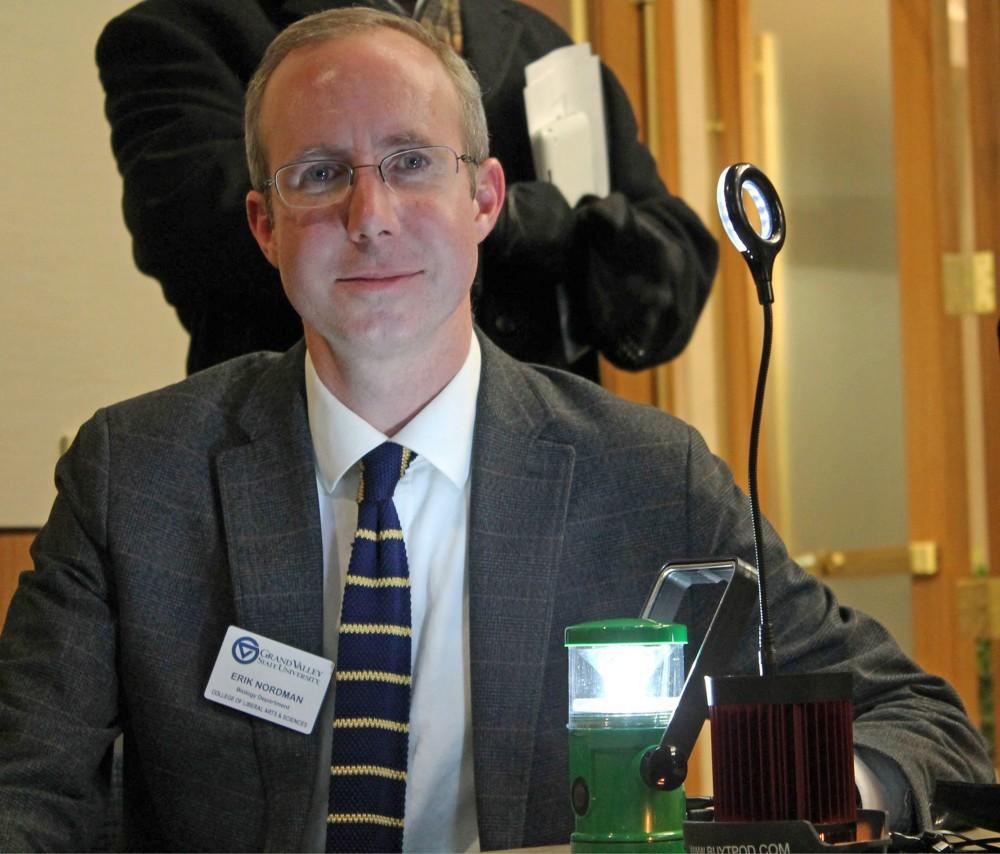GVSU professor explores renewable energy options in Africa

GVL / Gabrielle Patti Doctor Erik Nordman with the solar powered K-lantern and a led lightbulb lamp; both are examples of renewable energy at work.
Feb 12, 2014
After returning from a year-long sabbatical at Kenyatta University in Kenya, professor Erik Nordman spoke with the Grand Valley State University community on Tuesday about his research on renewable energy options.
The lecture, “Africa: the Next Renewable Energy Frontier,” was part of a series hosted by the Michigan Alternative and Renewable Energy Center.
“We want to spur economic development, invest in cleaner technology and improve in health and well being for people around the world,” said Nordman, a professor of natural resources management at GVSU. “One thing that really hit home while I was in Kenya is that being poor is expensive.”
More than 80 percent of Africans depend on traditional fuels to meet their energy needs, and energy in a poor country is expensive. Although the benefits of renewable energy outweigh the costs, implementing these clean practices in a country like Kenya is not always so simple.
Nordman said that obstacles are often political or due to a lack of financing.
In order to introduce renewable energy practices, he said cultural barriers need to be broken for Africans to trust that the new products will work. He proposed offering affordable sources of renewable energy as opposed to donating products.
“When the item is donated, there is no sense of ownership,” Nordman said. “We have the technology, we know how to build these things and we have the tools. The challenge is getting these innovations into the hands of the people who are going to use them and displace those conventional, more populating technologies.”
He added that providing electricity through renewable energy sources has the potential to raise the overall quality of living by improving the economy, decreasing pollution and raising the life expectancy.
“Renewable energy is powering everything from tea factories to refugee camps,” he said. “Kenya is the third largest tea provider in the world. Tea is essential to the economy.”
Providing renewable electricity could also help on a global scale.
“Black carbon is a considerable source of global warming and can cause catastrophic climate change,” Nordman said. He said he hopes that by providing an alternative, some of these changes can be prevented.
Various companies around the world are helping to contribute to the renewable energy services by exploring possibilities with solar, wind and water power. Several Michigan based companies have contributed to this growing search.
“West Michigan companies are leaders in bringing clean energy technologies to Africa,” Nordman said.
Viability Africa is a company founded by two GVSU alumni who are managing $250 million of renewable energy projects in East Africa. Another West Michigan product is the KLight; a solar lantern and a cellphone battery charger.
“West Michigan entrepreneurs are delivering on the promise of renewable energy in Africa,” Nordman said.
He hopes to see this trend continue.























